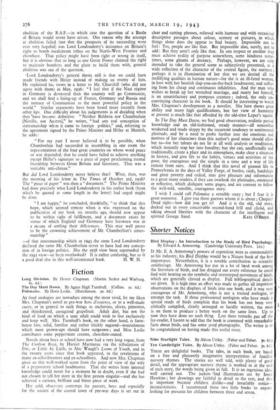Fiction
The Day Must Dawn. By Agnes Sligh Turnbull. (Collins. 9s. 6d.) Polonaise. By Doris Leslie. (Hutchinson. 9s. 6d.)
As food analogies are nowadays among the most vivid, let me liken Mrs. Chapman's novel to pre-war hors d'oeuvres, or to a well-made curry, or in general to such things as anchovies, olives, pimentos, and thinskinned, unsugared grapefruit. Adult diet, but not the kind of food on which a sane adult could wish to live exclusively and keep well. Mrs. Turnbull's book, on the other hand, is farm- house fare, solid, familiar and rather thickly sugared—nourishment which most grown-ups should have outgrown ; and Miss Leslie contributes some peppermint creams, chocolate-coated.
Novels about boys at school have now had a very long vogue, from The Crofton Boys, by Harriet Martineau via the tribulations of Eric, or Little by Little, to Alec Waugh's Loom of Youth, and in the twenty years since that book appeared, in the revelations of many ex-schoolmasters and ex-schoolboys. And now Mrs. Chapman gives us this well-worked scene from the point of view of the wife of a preparatory school headmaster. That she writes from internal knowledge could never for a moment be in doubt, even if she had not chosen to tell her story in the first person singular—and she has achieved a curious, brilliant and bitter piece of work.
Her cold, observant contempt for parents, boys and especially for the society of the coastal town of pre-war days is set out in
clear and cutting phrases, relieved with humour and with occasional descriptive passages about colour, scenery or pictures, in which things alone does she appear to find beauty. Impossible not to feel: Yes, people are like that. But impossible also, surely, not to add: But they aren't only like that. In one respect or another they must achieve reality of purpose somewhere, some kindness some- times, some gleams of. decency. Perhaps, however, we are only intended to take the general scene as subjectively presented, as a wide reflection of the character of the central figure, the narrator; perhaps it is in illumination of her that we are denied all the mollifying qualities in human nature—for she is an ill-fated woman, in love with her boorish slap-you-on-the-back headmaster, and suffer- ing from his cheap and continuous infidelities. And the man who wishes to break up her wretched marriage, and marry her himself, is an unsatisfactory and pompous creature ; indeed, the only un- 0 convincing character in the book. It should be interesting. to watch Mrs. Chapman's development as a novelist. She here shows great ability and many high qualifications, but her view of humanity at present is much like that afforded by the old-time Leper's squint.
In The Day Must Dawn, we find good observation, realistic period knowledge and an old-fashioned, steady manner—all somewhat weakened and made sloppy by the recurrent tendency to sentimental platitude, and by a need to probe further into the emotions and motives of her characters than this author's good sense should allow her to—for her talents do not lie at all with analysis or meditation, which instantly trap her into banality; but she can, unaffectedly and traditionally, create a place and its atmosphere, make clear a situation in history, and give life to the habits, virtues and activities of the poor, the courageous and the simple in a time and a way of life remote from ours. And I think that this novel of pioneer life in Pennsylvania in the days of Valley Forge, of battles, raids, hardships and great poverty and ordeal, may give pleasure and information to a great many readers, if they can overlook the platitudes, emotional or reflective, which disfigure some pages, and are content to follow the well-told, sensible, courageous story.
I wish I could call Polonaise a sensible story ; but I fear it is great nonsense. I give you three guesses whom it is about ; Chopin? Dead right—how did you get it? And it is the old, old story, decked out in every conceivable second-hand frill and cliché, and taking absurd liberties with the character of the intelligent and


























 Previous page
Previous page